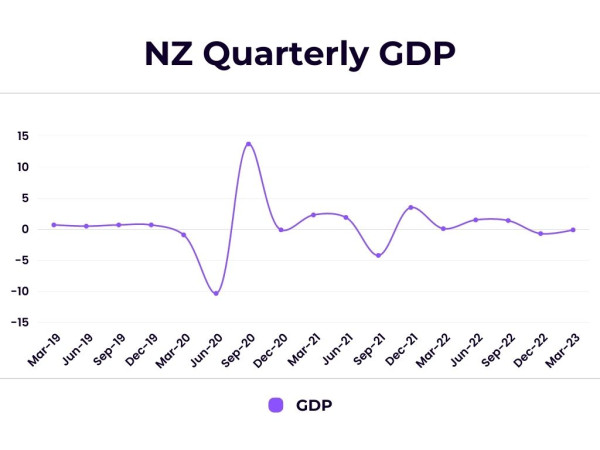New economy data released today revealed that New Zealand has entered a technical recession - but what does that mean and how will that impact you?
While recession is a scary word and means things aren’t as great in our economy as we’d like them to be, the announcement today doesn’t mean anything bad is going to happen overnight.
Your groceries, fuel and rent should be just as expensive tomorrow as they are today (which I think we can all agree are too expensive already).
But it does mean that unless we do something about it they could get more expensive going forward.
Put simply, saying we are in a recession is just acknowledging that our economy is in a period of losing value, instead of gaining it.
The way we determine that is with our Gross Domestic Product or GDP. This is the size of the economy when you add together the value of all of the goods and services produced in a country.
When your economy is healthy, the value of what we produce and sell should go up.
When an economy is struggling, the value will go down.
In the last two quarters of this year the size of New Zealand’s GDP went down - first by 0.7% and then by 0.1%.
One of the main ways economists decide if a country is in recession is if its GDP declines by two quarters in a row.
Which ours just did.

NZ’s quarterly GDP change since 2019. The bumpy bit in the middle is the Covid-19 pandemic.
So what happens now?
A lot of that depends on how long it lasts. Thankfully, over the past several decades the frequency and length of recessions has decreased. Most recessions in that period have been less than a year.
This recession has largely been driven by more demand for resources than are available right now because of events like the pandemic and the war in Ukraine.
The result of that has been the painfully high inflation we’ve been experiencing.
Unlike the recession caused by the housing market crash in 2008, this means we have already been experiencing the pain of the recession with the rising cost of living over the past several years.
However, it’s still not clear if we have reached the peak of these rising costs or not, so we may still see some of the most common side effects of a recession emerge or get worse.
These include things like:
- A rise in unemployment
- Lower incomes and pay rises
- The value of properties falling
- A rise in the cost of goods and services like food and rent
What can we do to get out of it?
Thankfully, quite a few of the pressures that have led to this recession are already improving.
For instance, as a small nation we import a lot of stuff and because the whole world is experiencing supply issues and inflation right now, we’ve been importing the higher costs through this and elevated shipping costs.
Shipping costs have been reducing though, which is a sign the costs of goods could start to come down.
Another big hit to our GDP has been the reduction in tourism, overseas students and labour through the pandemic. These are starting to pick up, but part of the hit on our GDP has come from this recovery.
But we can’t just sit on our hands and wait for things to improve.
There are things our Government needs to do for the long term health of our economy.
Some of the key recommendations the International Monetary Fund made in a report earlier this month included fast-tracking housing development, reducing government spending, and tax reform (including the introduction of a capital gains tax).
For you though, the best you can do is try and be as responsible with your money as possible to weather this recession period.
More stories:
Budget 2023: We read it so you don't have to
Here’s what you need to know.
AI could make our lives better – but not at its current speed
"I have seen enough movies to know how this ends."
Breaking down the Budget for my fellow dumbasses
How to sound smart if somebody brings up the Budget this weekend.